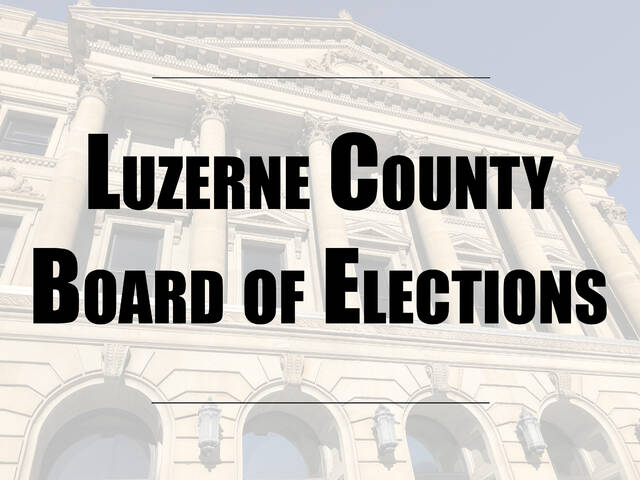Luzerne County’s Election Board voted Wednesday to accept the election bureau’s recommendation to lease a new voting system from Hart InterCivic for use in 2026.
County Council will make the final decision on the voting system. A potential change was pursued because the five-year maintenance and support contract with voting equipment supplier Dominion Voting Systems expires at the end of this year, officials said.
In other matters Wednesday, the election board approved a Nov. 4 general election referendum asking county voters if they want to adopt the proposed new county home rule charter drafted by the Government Study Commission.
Election board members also weighed in on the election bureau’s new procedure for the public to obtain campaign finance reports and provided an update on the board’s review of mail ballot drop box surveillance footage from this year’s May primary election.
Voting system
All four election board members in attendance Wednesday approved the Hart InterCivic system recommendation: Chair Christine Boyle, Vice Chair Alyssa Fusaro, Albert Schlosser and Daniel Schramm.
Rick Morelli, the fifth member, said he was unable to attend due to personal commitments but submitted a comment indicating he spoke with Election Director Emily Cook about the matter, fully supports the selection of Hart and encourages county council to approve the recommendation.
Cook said she and other election workers unanimously selected the Hart InterCivic system after interviewing and reviewing equipment from all four prospective vendors and visiting other counties for worker feedback and observation.
The bureau is still tallying a final lease cost because prices submitted in response to the county’s public solicitation included items that won’t be needed by the county, Cook said. She also said the county would not have to come up with the full cost to lease machines because there will be savings on other expenses, including a switch to an in-house ballot design and programming instead of paying the outside vendor.
Cook is recommending having voters fill out selections on paper ballots and then feeding them into the Hart InterCivic tabulators to be tallied, which will reduce the equipment needed.
Under the current system, voters make selections on computerized touchscreen ballot marking devices, print out the ballot for review and then feed it into a tabulator.
Generally speaking — without factoring in off-setting savings — the cost to lease the Hart InterCivic system would be approximately $500,000 annually, with support included.
Another option for council would be negotiating a new maintenance and support contract to continue using the Dominion system for a set number of years. Council had approved the purchase of Dominion’s system for $3.6 million at the end of 2019 as part of a state mandate for all counties to implement systems with the paper record that can be verified by voters and kept in case tallies are questioned.
According to a report attached to Wednesday’s board agenda, the election bureau’s recommendation to lease the Hart system was “driven by the system’s user-friendly interface, which will enhance in-house management and reduce costs, the compact and efficient polling place equipment, and the robust security features that ensure the integrity of the election process.”
Speaking during public comment, Hart representative Kelley Hood thanked the board for its recommendation and said the election bureau’s due diligence was “very thorough” and “impressive.” If the change is approved by council, Hood said her company would deliver the “highest level of service.”
Charter question
After discussion, the election board opted to change two words in the referendum “plain English” statement submitted by the study commission.
The original proposal: “A ‘yes’ vote means that you are voting to adopt the proposed Home Rule Charter for Luzerne County, which will change the existing form of government. A ‘no’ vote means you favor retention of the current Home Rule Charter form of government.”
The election board’s word changes applied to the second sentence regarding a no vote and were intended to simplify and clarify the question before voters.
The new sentence, with the changed words in bold: “A ‘no’ vote means you favor keeping the existing Home Rule Charter form of government.”
Campaign finance
The election bureau decided in June it would require the public to submit a form to view campaign finance reports instead of posting them online.
Cook had said caution was raised about the online posting of home addresses of candidates and elected officials during a conference for eastern Pennsylvania election office officials held shortly after the June shooting deaths of former Minnesota House Speaker Melissa Hortman and her husband Mark at their residence and another shooting that seriously wounded state Sen. John Hoffman, and his wife, Yvette, at their house.
Redacting addresses has been mentioned as an option, but Cook had said the bureau does not have the manpower to block out such information for multiple reports annually dating back years. County Controller Walter Griffith had proposed hiring an outside vendor to handle the posting and redaction.
Cook told the board Wednesday the bureau is pursuing Griffith’s suggestion and is comparing packages from two outside vendors. She promised a concrete plan by the board’s September meeting.
Griffith complained the current form to request copies of reports wrongly threatens a legal penalty if the requester shares the reports with others, even though no such restriction can be placed on a public document.
County Assistant Solicitor Gene Molino concurred with Griffith and said he will work with the bureau to eliminate the penalty language.
Fusaro said she will volunteer to redact the addresses if necessary because the public should easily have the ability to “follow the money” and track campaign finance reports.
Morelli’s statement also urged the bureau to obtain the necessary support to post the reports, saying “transparency in campaign finance is essential.”
Drop box review
Following past protocol for bipartisan board spot-checks of drop boxes, Boyle and Fusaro reviewed photographs from the drop box in the lobby of the county’s Penn Place Building in downtown Wilkes-Barre from April 25 through May 16 and surveillance video from May 15 for that box and the one by the election bureau on the building’s second floor.
They found 36 instances in which voters deposited more than one ballot and concluded most appeared to involve voters dropping off ballots with the same family surname or physical address, Boyle said.
Of the 36 instances:
• 31 dropped off two ballots
• Three dropped off three
• Two dropped off four
The information was forwarded to the election bureau for possible referral to the county District Attorney’s Office.
Reach Jennifer Learn-Andes at 570-991-6388 or on Twitter @TLJenLearnAndes.




